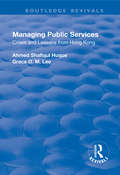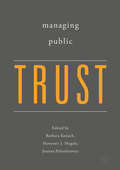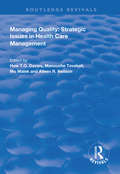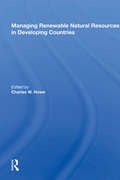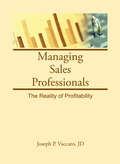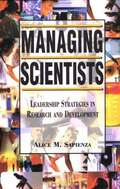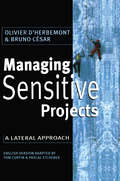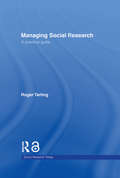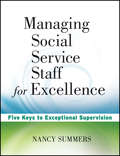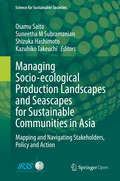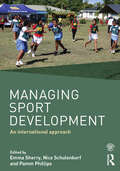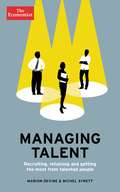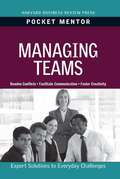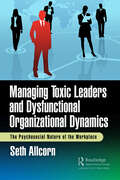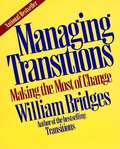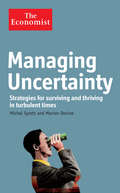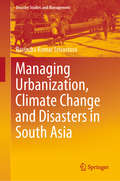- Table View
- List View
Managing Protected Areas: People and Places
by Richard Clarke Niall Finneran Denise HewlettThis open access book brings together 16 specially commissioned chapters drawn from a range of different professional-practitioner and academic global perspectives on the importance of the relationship between people and green and blue spaces. It focuses on issues surrounding the importance of natural environments on public health and wellbeing, and the environmental, cultural, and social importance of green and blue spaces that can result through responsible and sustainable adaptive management processes. It explores how the Covid-19 pandemic forced reconsiderations of our relationship with these natural spaces and highlights the important impact of the pace of climate change. While not pretending to have the answers, the stimulating and imaginative contributions embrace rich perspectives drawn from backgrounds as diverse as heritage studies, tourism, conservation, geography, policy formulation, public health, environmental health, research methods, history, literature, art, and theology.
Managing Psychosocial Hazards and Work-Related Stress in Today’s Work Environment: International Insights for U.S. Organizations
by Ellen Pinkos CobbToday’s evolving world of work makes it imperative for employers to manage psychosocial hazards (PSH) and risks leading to work-related stress. This book contains essential, general and country-specific information and templates for the successful management of hazards so as to prevent psychological harm in the workplace. Acknowledged as global issues affecting all workers and industries, PSHs are work factors that have the potential to lead to physical or psychological injury and stress, relating to how work is designed, organized, and managed, and to work relationships and interactions. This book advances the idea that management of PSH and psychological health and safety is part of today’s responsible and ethical employers’ duty of care for employees, and that United States employers should recognize this responsibility. Easy to follow, this guide presents comprehensive information on addressing PSH, discussing measures taken internationally (laws, guidance, and resources from Europe, Canada, Mexico, Australia, and Japan), as well as a new global standard on psychological health and safety at work. Practitioners and students in the fields of management, occupational health and safety, human resource management, ethics and compliance, occupational health psychology, and organizational psychology will come away with a deeper understanding of the importance of PSH and their management.
Managing Public Services: Crises and Lessons from Hong Kong (Routledge Revivals)
by Ahmed Shafiqul Huque Grace O.M. LeeThis title was first published in 2000: The management of public services is becoming an increasingly difficult task. Demands are increasing while funds appear to be decreasing, but quality of service must remain high. New services are required, demands have to be faced, activities don't always go according to plan and problems emerge in unexpected places and at unusual times; and public managers are expected to deal with these deviations from their regular work patterns. While some activities are concrete in nature and can be seen, such as medical care and education, others are obscured from public view. With governments emphasizing areas that produce visible and quantifiable results, they often neglect the intangible services that must also be provided to the public. Poor performance in these areas can contribute to major crisi in public organizations. This volume examines four case studies in the context of the changing political and social environment of the new Hong Kong Special Administrative Region of the People's Republic of China. The use of these cases from the public sector in Hong Kong will hopefully help readers to understand the difficulties faced by modern governments in providing basic services to the public.
Managing Public Trust
by Barbara Kożuch Sławomir J. Magala Joanna PaliszkiewiczThis book brings together the theory and practice of managing public trust. It examines the current state of public trust, including a comprehensive global overview of both the research and practical applications of managing public trust by presenting research from seven countries (Brazil, Finland, Poland, Hungary, Portugal, Taiwan, Turkey) from three continents. The book is divided into five parts, covering the meaning of trust, types, dimension and the role of trust in management; the organizational challenges in relation to public trust; the impact of social media on the development of public trust; the dynamics of public trust in business; and public trust in different cultural contexts.
Managing Quality: Strategic Issues in Health Care Management (Routledge Revivals)
by Mo Malek Manouche Tavakoli Huw T.O. Davies Aileen R. NeilsonFirst published in 1999, this eclectic collection of papers examines quality management in health care from a variety of standpoints. Managers, health care professionals and patients all have valid – but often differing – perspectives on the nature of quality, its creation and maintenance. This book explores these perspectives, beginning by asking such fundamental questions as ‘Is health care a business?’, ‘How should health services be designed?’ and ‘What is quality of care?’. Subsequent chapters then address the practicalities of measuring and improving health care quality. The chequered history of clinical audit is exposed in the UK (essentially the Plan-Do-Check-Act cycle familiar to quality improvement specialists), and lessons are drawn for managerial action needed to increase the impact of such activities. These lessons have wider relevance to all involved in promoting the principles of continuous quality improvement (CQI). In addition, exploration of the growing role of performance indicators raises important issues about their meaningfulness and instrumentality in effecting real change. Improving clinical quality is now at the top of the agenda for many health systems. This book reviews the challenges faced and the tools available to meet them. It should prove valuable to a wide range of health care stakeholders interested in broadening their understanding of this rapidly developing field.
Managing Renewable Natural Resources In Developing Countries
by Charles W. HoweMuch of the improvement in material living standards in the Third World is attributable to the exploitation of nonrenewable resources such as fossil fuels and metallic ores, and to the exploitation of renewable resource systems at rates that cannot be sustained. This state of affairs presents a serious problem for the future; just as may be the case for the developed regions, a long-term perspective shows clearly that Third World countries must return to a greater dependence on renewable resources while also avoiding irreversible degradation of renewable systems and learning to manage these systems more productively. The authors of this book examine major issues in the four main renewable resource sectors—fisheries, forestry, agriculture, and water—with emphasis on the problems and benefits attendant to various use patterns and management practices.
Managing Sales Professionals: The Reality of Profitability
by William Winston Joseph P VaccaroThis book is designed for sales managers as they make decisions and solve problems on a day-to-day basis. Managing Sales Professionals provides readers with specific details and illustrates how to plan, organize, staff, operate, and evaluate a sales force and its activities. This book offers an approach that is practical and realistic--one that is needed by sales managers who want to oversee a successful sales staff.The author, Joseph Vaccaro, uses an “integrated model” approach. He integrates the marketing mix as it relates to selling, and then he delves into the daily situations and problems readers encounter as practicing sales managers. With cases at the end of each chapter that make the chapter material come to life, Managing Sales Professionals is a practical tool for those in the world of marketing and sales management. It is a realistic, pragmatic, practical, how-to approach that explains complex concepts in a clear and concise manner. Vaccaro avoids generalities, and he cuts right to the critical specifics for sales managers in the real world.Terms and concepts are clearly defined, and each chapter concludes with penetrating questions to further develop your sales management skills. Along with a highly pertinent chapter on legal and ethical aspects in selling, Managing Sales Professionals covers:how to recruit salespeoplemotivation proceduresgender and racial diversity of the sales forcehow to plan and conduct a training programeffective selling techniqueshow to develop brand awarenessnew sales technologyhow to determine pricing and discount policiescompensation policieshow to determine transportation policiescontrol and evaluation procedureshow to effectively interact with marketingAnyone looking to increase sales, such as business owners, consultants, marketing professionals, and practicing salespeople and sales managers, can use this book to examine their sales staffs and look for areas in which to improve. Managing Sales Professionals is also ideal for upper level undergraduate students as they learn the basics of how to sell, organize, and run a sales force.
Managing Scientists: Leadership Strategies in Research and Development
by Alice M. SapienzaIn today's climate of enormous scientific and technological competition, it is more crucial than ever that scientists' involvement in research and development be managed well.
Managing Sensitive Projects: A Lateral Approach
by Olivier D'Herbemont Bruno CesarEvery day, managers must adapt to rapidly changing markets and situations. This book deals with sensitive or difficult projects, ranging from redundancy programs to disposal of radioactive waste, from the launch of a new product to the introduction of a new computer system. The authors use a revolutionary way to manage sensitive projects--the lateral approach. Derived from twenty years' experience working with managers, the lateral approach is a flexible and non- confrontational method that introduces change through an understanding of how people think and act. While communities and organizations often resist change even though they will benefit from it, this approach shows how projects can be successfully managed.
Managing Sex in the U.S. Military: Gender, Identity, and Behavior (Studies in War, Society, and the Military)
by Beth Bailey Alesha E. Doan Kara Dixon Vuic Shannon PortilloThe U.S. military is a massive institution, and its policies on sex, gender, and sexuality have shaped the experiences of tens of millions of Americans, sometimes in life-altering fashion. The essays in Managing Sex in the U.S. Military examine historical and contemporary military policies and offer different perspectives on the broad question: &“How does the U.S. military attempt to manage sex?&” This collection focuses on the U.S. military&’s historical and contemporary attempts to manage sex—a term that is, in practice, slippery and indefinite, encompassing gender and gender identity, sexuality and sexual orientation, and sexual behaviors and practices, along with their outcomes. In each chapter, the authors analyze the military&’s evolving definitions of sex, sexuality, and gender, and the significance of those definitions to both the military and American society.
Managing Social Change and Social Policy in Greater China: Welfare Regimes in Transition (Routledge Research On Public and Social Policy in Asia)
by Ka Ho Mok Maggie K. W. LauEast Asia is at the heart of the global economic transformation, and the countries of the region are witnessing rapidly changing labour markets, alongside the pressure to cut production costs and lower taxes in order to become successful ‘competition states’. These changes have resulted in increased welfare demands which governments, organizations and agencies across the region have had to address. This book examines welfare regimes in the Greater China region, encompassing mainland China, Hong Kong, Macao and Taiwan. In so doing, it explores the ways in which the rapid growth and internationalisation of the economy across Greater China is presenting new social policy challenges that governments, social welfare organizations and agencies in the region are having to respond to. Rather than simply describing and categorising welfare systems, the contributors to this volume add to our understanding of how one of the major economic transformations of the contemporary era in East Asia is shaping welfare provision in the region. In turn, in this context of economic change, they examine the new strategies and measures that have been adopted in order to reduce the heavy burden on the state in terms of welfare provision, whilst also attempting to diversify funding and provision sources to meet the pressing welfare needs. Based upon extensive fieldwork by leading scholars of social policy, this book will appeal to students and scholars of Asian social policy, comparative development and social policy, social welfare and Chinese studies.
Managing Social Research: A Practical Guide (Social Research Today)
by Roger TarlingAn essential tool for those planning to undertake social research, this exceptional book tackles many of the specific concerns and issues that arise. A well structured text, it offers a comprehensive introduction to a range of important areas in project management, including: commissioning research preparing a tender or grant application risk and stakeholder analysis managing the field work and data analysis financial management ethics, confidentiality and copyright. This book provides a unique source of guidance for anyone seeking to commission, manage or carry out social research. It will especially benefit researchers working in a variety of different contexts, including those in academia, central or local government, 'quangos', public bodies or private consulting companies.
Managing Social Service Staff for Excellence
by Nancy SummersAn essential guide for those charged with supervision of nonclinical staffin programs, agencies, and units within social service organizations"As someone who has worked in social service agencies, consulted with hundreds of them, and who teaches social service professionals, Ms. Summers knows the issues faced by agencies firsthand. From this experience she has compiled a thoughtful and well-organized text that identifies the principles of effective supervision."--Samuel Knapp, EdD Director of Professional Affairs, Pennsylvania Psychological AssociationFrom the ForewordThe care of patients and clients of social service agencies is increasingly being performed by paraprofessionals or professionals with little experience. While there are many books written about giving quality clinical supervision, there is very little on supervising the least experienced frontline nonclinical and clinical staff to teach and promote positive and effective interaction with clients, and provide staff support and training that elevates quality care, improves job satisfaction, and minimizes staff turnover.Based on author Nancy Summers' many years of working with troubled social service agencies, Managing Social Service Staff for Excellence: Five Keys to Exceptional Supervision fills this need and offers numerous ideas for securing the best care for those served by social service agencies.Common problems faced by agencies are examined with regard to employee behavior and wellness, including staff teamwork, how to build healthy staff/client relationships, and the identification and prevention of routine disrespect of clients and their needs. Diagnostic techniques are presented for identifying these problems, as well as remedies and prevention programs that can be put in place without great expense.Filled with interviews and numerous case examples, Managing Social Service Staff for Excellence offers a step-by-step process for: creating good preventive measures to counteract negative practices that can occur; developing robust commitment and enthusiasm; and getting back on the right track after unfortunate incidents have taken place.
Managing Socio-ecological Production Landscapes and Seascapes for Sustainable Communities in Asia: Mapping and Navigating Stakeholders, Policy and Action (Science for Sustainable Societies)
by Osamu Saito Kazuhiko Takeuchi Suneetha M Subramanian Shizuka HashimotoThis open access book presents up-to-date analyses of community-based approaches to sustainable resource management of SEPLS (socio-ecological production landscapes and seascapes) in areas where a harmonious relationship between the natural environment and the people who inhabit it is essential to ensure community and environmental well-being as well as to build resilience in the ecosystems that support this well-being. Understanding SEPLS and the forces of change that can weaken their resilience requires the integration of knowledge across a wide range of academic disciplines as well as from indigenous knowledge and experience. Moreover, given the wide variation in the socio-ecological makeup of SEPLS around the globe, as well as in their political and economic contexts, individual communities will be at the forefront of developing the measures appropriate for their unique circumstances. This in turn requires robust communication systems and broad participatory approaches.Sustainability science (SuS) research is highly integrated, participatory and solutions driven, and as such is well suited to the study of SEPLS. Through case studies, literature reviews and SuS analyses, the book explores various approaches to stakeholder participation, policy development and appropriate action for the future of SEPLS. It provides communities, researchers and decision-makers at various levels with new tools and strategies for exploring scenarios and creating future visions for sustainable societies.
Managing Sport Development: An International Approach
by Nico Schulenkorf Emma Sherry Pamm Phillips Katie RoweNow in a fully revised and updated second edition, Managing Sport Development is a complete introduction to sport development, covering key concepts and theory as well as best practice in the management, implementation, and evaluation of sport development programs.This book explains what sport development is, and how it works, in both of its main areas of operation: the development of sport (creating pathways for participation and talent development) and sport for development (using sport as a tool to achieve outcomes beyond sport). Including international cases and data throughout, as well as discussion of both able-bodied and disability sport, it examines the organisation and governance of sport development programs around the world and how to achieve the right outcomes. This new edition includes new and expanded coverage of such topics as sustainable development; the impact of COVID-19; integrity and human rights; careers in sport development; the role of coaches, change agents, and volunteers; and the research process and knowledge sharing. This book includes a range of useful features to aid understanding, such as learning objectives, real-world data and examples, key terms, and review questions.Managing Sport Development is an essential text for any introductory sport development course and invaluable reading for any course on international sport management, sport policy, sport governance, sport and social issues, or coach education.Ancillary resources accompanying this book include PowerPoint slides and a test bank.
Managing Sport Development: An international approach
by Nico Schulenkorf Emma Sherry Pamm PhillipsSport development has become a significant part of the international sport industry. The development of sport (creating pathways for participation and talent development) and sport for development (using sport as a tool to achieve outcomes beyond sport) are now fundamental aspects of the organisation and governance of sport around the world. Consequently, any manager working in sport today needs to understand what sport development is and how sport development programs can be managed, implemented and evaluated. This is the first undergraduate textbook to offer a complete introduction to sport development, covering theory and its application to managerial practice, with examples from international contexts. The book integrates discussion of the development of sport and sport for development in every chapter, with international case studies to illustrate the significance and application of both. Each chapter introduces key theory, examines the implications of theory for practice and critically analyses practical managerial issues. Discussion of both able-bodied and disability sport are embedded throughout, and the book includes a range of useful features to aid understanding, such as learning objectives, real world data and examples, key terms, review questions, and a companion website containing slides and a test bank for instructors. Managing Sport Development is an essential text for any introductory sport development course, and invaluable reading for any course on international sport management, sport policy, sport governance, sport and social issues, or coach education.
Managing Sport: Social and Cultural Perspectives (Foundations of Sport Management)
by David Hassan Jim LustedContemporary sport is shaped by wider society. Today those managing sport must be aware of the broader social and cultural context within which it exists if their effectiveness is to be established and their careers defined. This book is the first of its kind to contextualise the wider social and cultural environment of sport management and explain the key issues and practical implications of this for those working, or intending to find employment, in the field. Written by a team of leading international experts on sport management, the book explores important topics such as corporate social responsibility in sport, race, gender and sexuality, sport and the media, globalisation, populations with individual needs, social class, social capital social exclusion. As part of a comprehensive coverage of these and many other social issues, the reader is reminded of the fundamental requirement to properly appreciate the cultural sensitivities of the managerial environment in which they intend to operate. Each issue is examined from the perspective of the manager or sport practitioner, and each chapter includes a range of useful features, such as case-studies and self-test questions, to encourage the reader to think critically about the role of sport in society and about their own professional practice. This is the first sports management textbook to be based on the thesis that a more socially aware manager is a more effective manager and thus should be regarded as essential reading for all sport management students.
Managing Talent: A Short Guide for the Digital Age
by Mike Rugg-GunnRecruiting, selecting, retaining and developing great people are essential for any successful business. And the combination of digital transformation and post-pandemic work realities presents major challenges for all organisations. This book provides best practice talent management guidance for businesses undertaking digital transformation or facing digital disruption. Taking the reader through the stages of talent acquisition, selection, retention and development, this practical and concise book: sets out, assesses and predicts how the digital revolution impacts talent management practices, and helps the reader navigate the journey from an analogue to a digital organisation; updates talent management concepts and illustrates these with examples and cases of best practice across the business world; and enables senior leaders, talent management professionals and managers to quickly access and implement key learnings through the use of practitioner point summaries and a set of Ten Top Tips in each relevant chapter. The book provides practical insights, grounded in research, into how to manage talent in a fluid and dynamic world of digital change and is aimed at senior leaders and managers, and the HR community. It clearly shows how organisations undertaking a digital journey need to flex and adapt their talent management processes.
Managing Talent: A Short Guide for the Digital Age
by Mike Rugg-GunnRecruiting, selecting, retaining and developing great people are essential for any successful business. And the combination of digital transformation and post-pandemic work realities presents major challenges for all organisations. This book provides best practice talent management guidance for businesses undertaking digital transformation or facing digital disruption. Taking the reader through the stages of talent acquisition, selection, retention and development, this practical and concise book: sets out, assesses and predicts how the digital revolution impacts talent management practices, and helps the reader navigate the journey from an analogue to a digital organisation; updates talent management concepts and illustrates these with examples and cases of best practice across the business world; and enables senior leaders, talent management professionals and managers to quickly access and implement key learnings through the use of practitioner point summaries and a set of Ten Top Tips in each relevant chapter. The book provides practical insights, grounded in research, into how to manage talent in a fluid and dynamic world of digital change and is aimed at senior leaders and managers, and the HR community. It clearly shows how organisations undertaking a digital journey need to flex and adapt their talent management processes.
Managing Talent: Recruiting, Retaining, and Getting the Most from Talented People (Economist Books)
by The Economist Marion Devine Michel SyrettSurvey after survey confirms how the success of businesses has become increasingly dependent on the ability and skills of their staff. And because talented workers are in short supply, the hunt for people of unusual ability will continue in earnest. Hiring such people is the relatively easy part; what really matters is to keep them engaged so that they don't move on, and to get the best out of them while they work for you.Drawing on original research, including interviews with senior executives in human resources, recruiters and headhunters, and people considered "talented" within their organizations, this book outlines the way in which companies such as Ford, Goldman Sachs, Cisco, Diageo, Tesco, General Electric and HSBC are facing the challenge of recruiting and developing the talent they need.This book will also boost readers' own career prospects with practical ideas on how to change their organization's perception of their potential.
Managing Teams (Pocket Mentor)
by Harvard Business Review<p>Leading teams is an essential skill every manager must possess. To do it effectively, you must know how to instill commitment in your team, improve communication among group members, and diagnose common problems that can derail a team. In this book, you'll find valuable advice and proven strategies for managing teams, including how to: <p> <li>Diagnose common problems that can impede team progress <li>Take corrective measures to remove team problems and improve performance <li>Resolve team conflicts <li>Promote interdependence within teams</li> </p>
Managing Toxic Leaders and Dysfunctional Organizational Dynamics: The Psychosocial Nature of the Workplace
by Seth AllcornUnderstanding experience at work, especially in organizations that have toxic leaders and dysfunctional organizational dynamics, is a multidimensional undertaking that must include in-depth perspectives informed by psychosocial theory. This may be best accomplished by relying on complementary theories to account for what is found and experienced in our organizations and in particular a better understanding of why this is happening. "Why did she do that?" "Why did he say that?" "Why did a group react the way they did?" “Why,” is critical in terms of understanding organizational dynamics.Our lives at work in large complex and multidimensional organizations are saturated with experience, some of which is fulfilling, and some are of a darker nature that arises from the presence of toxic leaders and dysfunctional organizational dynamics. Understanding these toxicities and dysfunctions and their effect on organization members is approached by first raising their awareness at the beginning of the book before providing psychosocially informed insights that form a basis for understanding and organizational change in the following sections.This book explores these work-life dynamics by grounding them in concrete examples and then using complementary psychoanalytically informed perspectives to illuminate their underlying, often unconscious nature filling an important gap in management and organizational literature.
Managing Transitions: Making the Most of Change
by William BridgesAimed at helping organizations understand change better and develop improved change strategies.
Managing Uncertainty: Strategies for surviving and thriving in turbulent times (Economist Books)
by Michel SyrettManaging uncertainty has become a new business imperative. Technological discontinuities, regulatory upheavals, geopolitical shocks, abrupt shifts in consumer tastes or behavior, and many other factors have emerged or intensified in recent years and together conspire to undermine even the most carefully constructed business strategies. Managing Uncertainty: Strategies for Surviving and Thriving in Turbulent Times addresses these new challenges, assessing the sources of business turbulence, how to classify uncertainty, and the different ways in which uncertainty can be embraced to allow greater innovation and growth. Drawing on examples from around the world, the book presents the most recent ideas on what it means to manage uncertainty, from practitioners, academics, and consultants. * Addresses the challenges of managing uncertainty in business * Presents a step-by-step guide to managing business uncertainty * Draws examples from major international companies, including Intel, Procter & Gamble, Siemens, Boeing, Quinetiq, Philips, China Telecom, Ford, Apple, Shell, Glaxo SmithKline and many more Written for business leaders and managers looking for new ways to ensure that their businesses continue to thrive in a world of increasing complexity, Managing Uncertainty presents new and innovative ideas about reducing risk by understanding difficult-to-predict shifts.
Managing Urbanization, Climate Change and Disasters in South Asia (Disaster Studies and Management)
by Ravindra Kumar SrivastavaThis book offers essential insights into potential catastrophic events that might befall upon the emerging urban landscape in South Asia, and which are due to hazards, risks and vulnerabilities inherent in the region’s geophysical location, as well as due to climate change and unplanned urbanization. It highlights major physio-graphic, demographic, geological and geophysical indicators that are responsible for changing the pattern and trend of urbanization in South Asia – a crucial issue in view of emerging threats of climate change, and changes in the demographic profile. The book addresses the disaster management scenario in South Asia, manifestations of climate change in the region and various urban setups under climate-change-induced risks. Further, it elaborates on the challenges of urbanization-based neo-risks and vulnerabilities, which manifest in the form of slum area growth, piling and littering of waste and filth, new health risks, groundwater contamination, air pollution, highly energy-dependent lifestyles, poverty, socio-economic tensions, etc. It also critically examines the institutional mechanisms for disaster risk reduction (DRR), climate change adaptation (CCA) and urban governance, and suggests appropriate changes in the governing structure to mitigate these risks. The book draws the attention of urban planners and policymakers to current shortcomings in the administrative and financial structures of local urban bodies. While outlining climate-associated risks and adaptation strategies in South Asia, it also suggests measures for integrating climate change and urban adaption with state's planning processes, and puts forward a risk alleviation platform to bring the risk managers working in different fields together, so that they make concerted efforts to achieve sustainable development. It offers valuable takeaways for researchers, urban planners, those working in industry, consultants, and policymakers.


